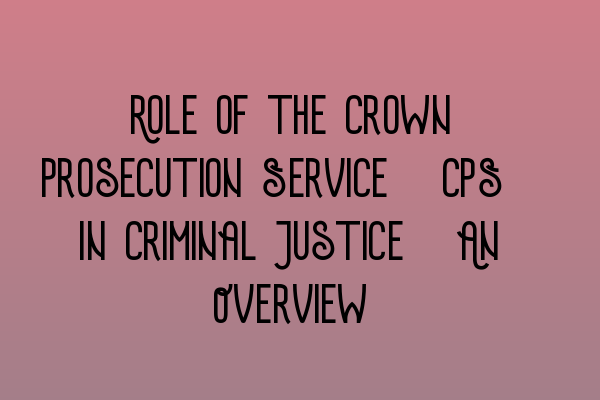Role of the Crown Prosecution Service (CPS) in Criminal Justice: An Overview
Welcome to SQE Criminal Law & Practice Law UK, where we provide comprehensive knowledge and guidance for aspiring legal professionals. In this article, we will delve into the crucial role played by the Crown Prosecution Service (CPS) in the criminal justice system.
What is the Crown Prosecution Service (CPS)?
The Crown Prosecution Service (CPS) is an independent body tasked with prosecuting criminal cases in England and Wales. It is responsible for reviewing cases investigated by the police, determining whether there is enough evidence to proceed with a prosecution, and presenting the case in court.
The Functions of the Crown Prosecution Service (CPS)
The CPS has several important functions:
- Reviewing cases: The CPS reviews the cases referred by the police to assess the evidence and determine whether it is in the public interest to prosecute.
- Making charging decisions: Based on the evidence, the CPS decides whether to charge an individual with a criminal offense.
- Court preparation: The CPS prepares the case for court, including gathering evidence, interviewing witnesses, and instructing barristers or advocates.
- Presenting the case in court: The CPS presents the evidence and arguments in court on behalf of the prosecution.
- Victim and witness support: The CPS ensures that victims and witnesses are given appropriate support throughout the legal process.
The Role of the CPS in the Criminal Justice System
The CPS plays a vital role in ensuring a fair and effective criminal justice system:
- Impartiality: The CPS acts independently and impartially, making decisions based on legal considerations and evidence.
- Public Interest: The CPS determines whether a prosecution is in the public interest by considering factors such as the seriousness of the offense, the impact on the victim, and the wider community.
- Evidence-based decisions: The CPS thoroughly reviews the evidence to determine whether there is a realistic prospect of conviction and whether it is in the public interest to proceed with the case.
- Supporting victims and witnesses: The CPS recognizes the importance of supporting victims and witnesses, providing information, assistance, and protection throughout the legal process.
Final Thoughts
The Crown Prosecution Service (CPS) plays a crucial role in the criminal justice system, ensuring that criminal cases are robustly presented and prosecuted. It carries out its functions independently and impartially, making decisions based on legal considerations and evidence. If you’re interested in learning more about the SQE exams or preparing for your legal career, check out our related articles:
- SQE 1 Practice Exam Questions
- SQE 1 Practice Mocks FLK1 FLK2
- SQE 2 Preparation Courses
- SQE 1 Preparation Courses
- SRA SQE Exam Dates
At SQE Criminal Law & Practice Law UK, we are here to support you on your journey to becoming a successful legal professional. Stay tuned for more informative articles and resources!
